I saw this a few days ago. I am going to try this out it sounds like fun :smile:
…
…
…
.
.
.
.
.
.
…
…
…
.
.
.
.
…
.
.
.
.
It seems to me that having the Initiative on a front is actually a disadvantage in naval operations.
This seems to be another instance where having the initiative is a disadvantage.
Player B could just wait to see what player A has done with his fighters and then take the opportunity to bomb undefended factories and NRZs.
As stated in a previous post, you could use as an alternative (which is seriously being considered for a revision) having the initiative player choosing to have the other player make his moves first in one, some or all of the initiative player’s Fronts of his choosing.
The rules state that Fighters have “air superiority: fighters hit other air units at a 4 or less. on a 2 or less, any casualty can be taken.”
I am confused about exactly what this means. My two guesses are:
-A: fighters can ONLY kill other aircraft. On a 4 or 3, the enemy chooses which aircraft to lose. On a 1 or 2, the owner of that fighter can choose the type of enemy aircraft which was lost.
-B: On a 3 or 4, a fighter scores a hit which must be taken from aircraft (chosen by the loser).
On a 1 or 2, the fighter scores a hit which can be any unit (even a ground unit). This unit is chosen by the owner of the fighter.
Similarly. the rules state that Tac Bombers have “land/sea attack: tac bombers hit ground/sea units at 4 or less. On a 2 or less any casualty can be chosen”
I am confused about exactly what this means. My two guesses are:
-A: Tac can ONLY kill ground/naval units. On a 4 or 3, the enemy chooses which ground/naval unit to lose. On a 1 or 2, the owner of that Tac can choose the type of enemy ground/naval which was lost.
-B: On a 3 or 4, a Tac scores a hit which must be taken from ground/naval (chosen by the loser).
On a 1 or 2, the Tac scores a hit which can be any unit (even an air unit). This unit is chosen by the owner of the Tac.
Can you clear this up?
For fighters, when you roll, a 3 or 4 result is a hit on a plane. � The defender MUST choose a plane as a casualty. � If the result is a 1 or 2, then the defender may choose anything as a casualty, such as a ground unit or a plane.
For Tac bombers, when you roll a 3 or 4 result, only sea or ground units can be chosen - no planes. � If the result is a 1 or 2, then the defenser could choose a plane, ground or sea unit as a casualty.
In each case, player that loses the units still chooses if there is a choice to be made.
2 versions of rules coming soon for World War II in Europe and World War II in the Pacific.
The current rules will become the advanced rules with expert rule add-ons, while the new rules will be the basic rules.
The basic rules will replace the initiative system of turn taking as well as the tit for tat movement system for the familiar Axis & Allies system. The old system is retained for the advanced rules, however.
Advanced Rules:
A game in progress starting in fall 1939. Each turn is 1 season (3 months).
This is the beginning set-up (there is also a spring 1941 set-up).
Neutrals and minor axis allies are not set-up until activated. Only Poland is activated at this point.
Italy, US and Russia are neutral and are also not activated until a certain date or attacked by the Axis.
A turn consists of a movement, combat, blitzkrieg, redeployment, convoy, build, collect money and initiative.
Axis begin with automatic initiative on all Fronts. This means that the Axis do all their movement first in all Fronts that they have initiative. Movement can be into combat, or to just move a unit (like Axis & Allies: WWI 1914).
When the Axis have finished their movement, then the Allies do their movement turn all at once. Units already in combat with the Axis cannot move, but the Allies can move all other units just as the Axis. They can even move units into a combat zone and reinforce it.
There is a stack limit, and it is based on points. Infantry are 1 point, tanks are 2 points and artillery are 3 points. There can be no more than 10 points of ground units in a space by one side. Planes are limited to 1 plane (or airbourne) per industrial zone. A fortress or airbase can add 1 extra plane to any zone. Airbases can be stacked, but each player nation has a limit as to how may airbases they can build.
Axis go first, as they start with initiative on all Fronts.
Germany opens up by attacking Krakow, Denmark and the Netherlands. German tanks and Tac are held back for the blitzkrieg phase. If they move now, they cannot be used in blitzkrieg phase.
Movement of units is the same as Axis & Allies.
After the Axis are done moving their units, then the Allies move their own units. However, ‘surprise attack’ rules are in play here, as explained below.
Unless already at war, any country - whether it is a player nation or minor country - will be affected by ‘surprise attack’ rules. ‘Surprise attack’ rules state that a country so affected cannot move any units in movement phase, and all units defend at 1. Bonuses for terrain still apply and units in a fortress or supply depot defend normally.
Normally, the Allies would counter-move after the Axis are finished doing their moves, but France, UK and Poland (the only active Allies at the start) are considered to be first time attacked by Germany and therefore suffer ‘surprise attack’. (I know that France and UK declared war on Germany, not the other way around, but their inaction in the first few months is replicated by this rule)
While neutral, USSR cannot conduct a turn except to occupy its half of Poland and associated territories. It must have enough units to occupy these zones and prevent a Nazi take over of any of these zones.
All attacks are successful. The attack on Krakow is successful and opens up the way to Warsaw.
Germany then uses all blitzkrieg capable units that have not already been used to move into Warsaw. Even if a tank was attacked in Movement phase, as long as it didn’t MOVE, then it can still be used in Blitzkrieg phase.
Only the side that has initiative can conduct Blitzkrieg (in this case it is the Axis). Units defending against blitzkrieg also suffer ‘surprise attack’ as stated above.
Germany captures Warsaw. In Redeployment Phase, Germany then moves its units by rail to the French frontier by rail. Each country has a certain number of rail points. 1 rail point can move 1 ground unit or airbase any number of connected land spaces. Ground units can be railed into newly conquered spaces, or units that were used in combat can be moved out of conquered spaces. Planes can fly, but airbases have to use rail to move. There is no limit to how many planes can be shuffled around. Purchases are placed in industrialized zones inside the player nation.
Active allies also do their redeployment and place new units.
France and UK set up a couple of their convoys to collect some of their overseas cash.
Germany collects $51 from a base of $45
UK collects $49 from a base of $35 (collecting some overseas cash)
France collects $35 from a base of $30 (also from convoys)
End of the fall 1939 turn. As Warsaw is not liberated at the end of the turn, Poland surrenders and all Polish units are removed from the board (according to the set-up chart). Poland and Denmark fall to Germany.
It is now winter 1939.
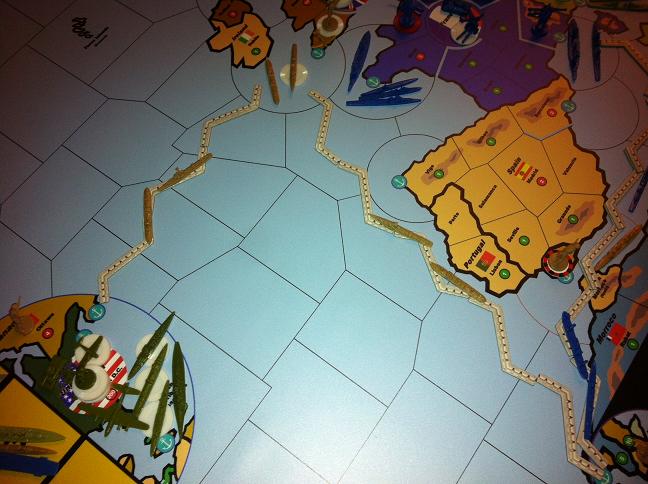
Fall 1939 turn will be posted tomorrow.
Yes please post a complete game including how the game works… explain combat sequence, and all turn sequences.
People will follow and want to try a game.
I suggest you have a larger map printed, the pieces are too tightly squeezed and it makes it hard to follow the battle odds.
my 2 cents
Understood.
Axis retain initiative on all Fronts, so Germany goes first in movement. Italy is still not activated.
Germany takes a gamble and pushes hard into all of Belgium (activating it as a British ally) both the northern space Brussels and the southern space of Leige.
The Germans are also sending a single unit into the French fortified space of Strasbourg to tie those units done and prevent them from reinforcing Leige (think of it as a penal batallion :lol:)
Germany holds back its Tac and 3 tanks in Frankfurt for blitzkrieg.

Now the map is large already as it is, and crowding does take place. You need to be tidy and chip whenever possible.
In cases where the zone is overflowing like the 2 spaces n Belgium, just do what we always do during the battle - pull the pieces and place somewhere else. The left is the units in Brussels and the right is Liege.

Before any dice are rolled, it is now the Allies turn. France and UK can move their units.
The Allies can choose to reinforce any space being attacked by the Germans, but they CANNOT move a unit from a space that is being attack by German ground units.
The Allies do a risky move and reinforce Brussels with any plane that makes it and as many infantry as possible up to the ground stack limit. Planes have no limit since they are in the air.
By moving their units into Brussels, they are subjecting all their units to ‘surprise attack’. Belgium is being attacked for the first time, so ‘surprise attack’ rules apply to all units that belong to Belgium as per the set-up as well as all units in the affected spaces.
Terrain bonuses still apply, however, and the Allies are defending from behind a river that the Germans have to cross. This gives all defending infantry a +1 defence bonus.
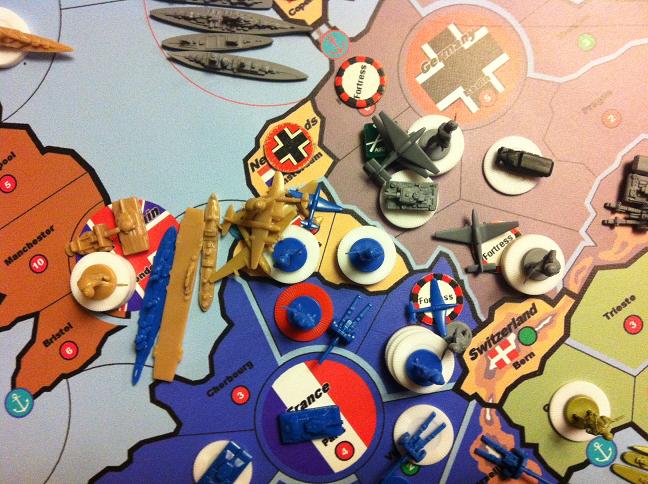
Now it is Combat phase.
The German infantry attacking the French fortress dies a miserable death, but both spaces in Belgium are captured. Although Brussels cost the Germans dearly. But it cost the Allies much more, reinforcing with the planes was probably a bad idea.
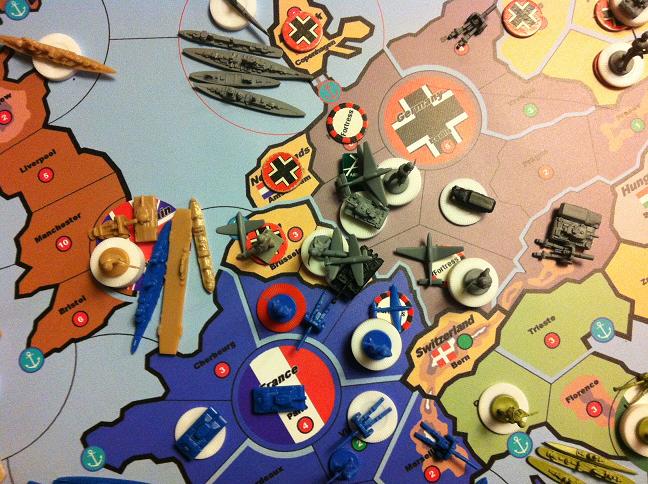
Germans can now do blitzkrieg. The Tac that was held back and the 3 tanks in Frankfurt blitz into Sedan. The French units there suffer ‘surprise attack’ from the blitz.

Germans win in Sedan. All planes land on their original airbases where they started the turn. All ships return to the ports they came from.
Now is redeployment phase for both Allies and Axis.
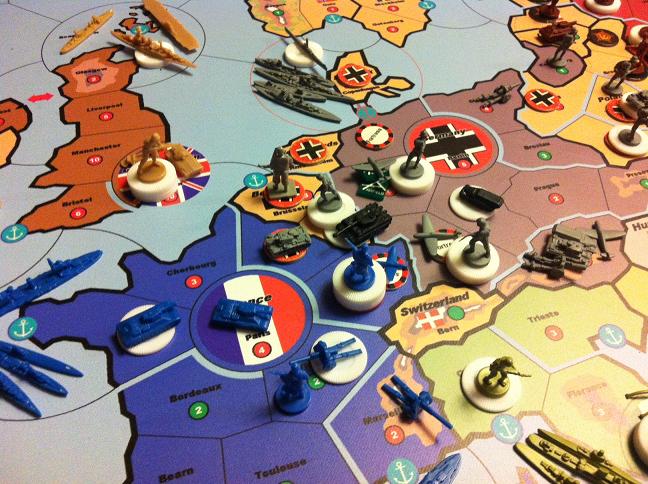
The Axis and Allies redeploy their units. The Allies have to redeploy first, and then the Germans do so. Since Germany has 8 rail points, 8 infantry are railed from other areas into Sedan to prepare for the next turn.
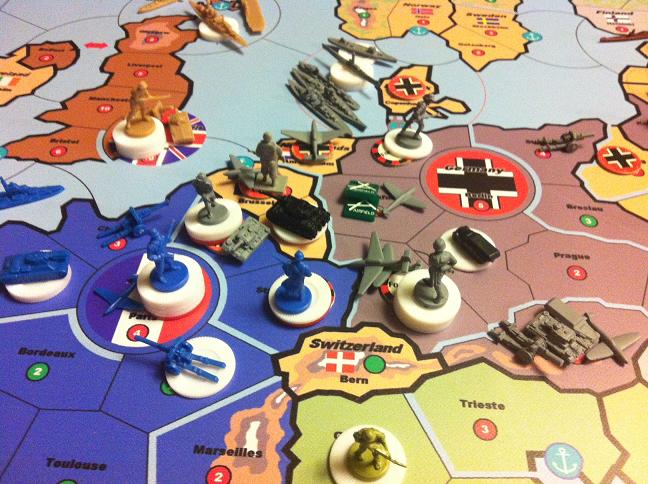
Britain has another transport that was built last turn that they are now going to use to start another convoy.
Both sides now buy and place their units in the build boxes.
Germany collects $55
France collects $35
UK collects $56
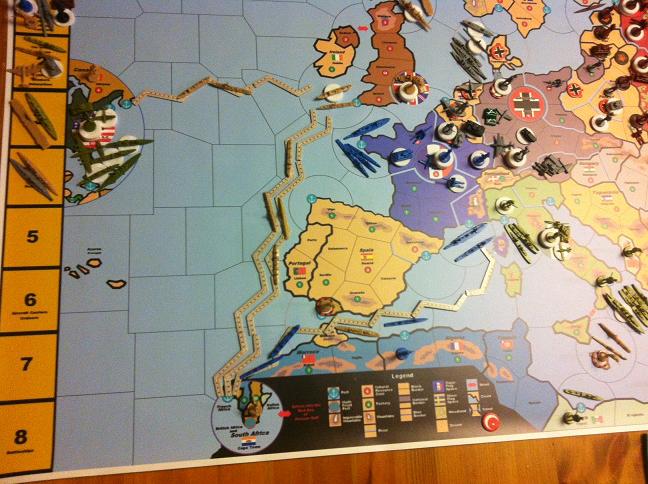
Buys are not placed immediately. They go into the build boxes. The boxes are numbered 1 - 8, and there is a list of units in certain boxes. Look for where a unit needs to be placed, and the unit is placed in that box. Infantry, transports, artillery and others go in box 1, while battleships go in box 8.
At the end of each turn, all units move up a box. So a battleship that was in box 8 moves to box 7. Units that are in box 1 that need to be moved up are to be built and are placed on the board.
